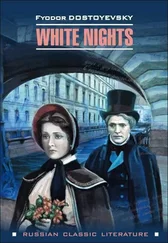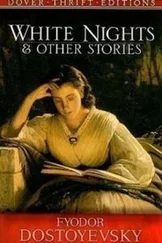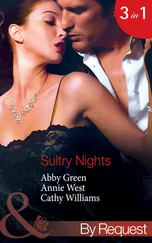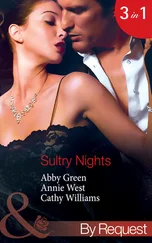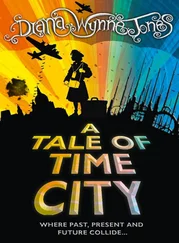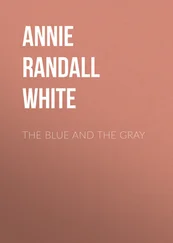“Don’t touch anything,” Mother had said to Birdie and I on our way over to Otto’s. “I’m not saying it’s their fault. They’re old is all. All they have is their germs.”
“It doesn’t spread like that,” I said.
“What doesn’t spread like what,” Mother said.
“What she has,” I said.
“What who has,” Mother repeated.
“His Helene,” I said. “Otto says she been sick so long whatever she’s down with is too worn out to jump anywhere else.”
Birdie leapt a little then in the road. She liked to try out the tricks they were teaching all the gymnasts at the gym. Small and round and tow-headed, Mother said Birdie was the type of child who would show up well on television. The nickname had stuck despite Father’s better efforts. He thought perhaps Birdie would be blind to her own charm and good looks. He’d wanted to see his youngest fashioned with a name with history behind it. “Don’t turn her into a bore,” Mother had said. “She’s got such a thrust for life.”
“It’s my new tumble,” Birdie said that morning, cartwheeling in the road.
“Very good, darling,” Mother said. “That was very good.”
Even still, Mother insisted we wash Otto Houser’s clean silver before we set the table. She’d seen that boy Ryan White on the television. There was a cancer afoot in Otto’s house and she wasn’t going to catch it, worn out or not. Otto was at the other end of the counter whipping the mayo and mashing the tuna. Mother took the spoons out of the drawer right in front of the old man’s face and washed them again. She heard the whisk of his fork stop against the side of the bowl.
“You must have been quite lucky once,” Mother said.
“How do you figure?” Otto said, glancing at Mother from the corner of his eye as he went to cut another can of fish on the opener under the cabinet.
“Your wife kept quite a kitchen,” Mother said nodding toward the living room where His Helene was asleep on the couch. “Everything at arms length. You can tell it’s just how Helene left it.”
We started laughing then. Me and the old man. Me and Otto Houser. Me and the Otto that was still hanging on that banister somewhere waiting for his wife and his tap lesson.
“You two have been spending some time together in my absence,” Mother said. “You and my daughter have adopted the same laugh.”
This made Otto howl even harder. Wilson was in on it then. He wanted to prove that he spoke his old man’s language. Wilson was full-grown with graying hair that was balding in the back. People said he was slow. Mother said he’d been touched by something. When he spoke, flecks of spittle formed around his mouth so that, if you were made to stand too close to him, you’d feel a fine mist. He lived in the RV out back. The trailer was parked on the lawn close to the porch. When Otto propped open the door, he could sit on his crumbling veranda and keep watch over his aging son.
That summer Wilson had started gumming a toothpick. Whenever you talked to him, he often repeated whatever you’d said, like he’d gotten stuck on a word and couldn’t get past it. In his confusion, the toothpick dropped out of the corner of his mouth and into the dirt. Without pause, Wilson picked it up off the ground and righted it back between his lips.
“Beg your pardon,” Otto Houser said to Mother when he’d come down a little. “It’s just been so damn sad around here. You can’t imagine.”
“I can imagine a lot of things,” Mother said.
She turned then to Wilson.
“Your laugh is infectious,” she said. She looked at him, taking his chin in her hand and examining both sides of his face.
“Infectious,” Wilson said.
“It means you give people something,” Mother said. “You give them something happy.” She clasped Wilson’s cheeks momentarily and kissed him on the lips. The kiss appeared almost an accident, a way for Mother to direct her focus toward something other than Otto’s laughter.
Wilson’s body shot up from his chair from the excitement.
“Infectious,” he chanted under his breath, going over the word with his mouth until he could form it properly. After a while the chanting got louder until he was yelling. There was something garish about watching a big man flail about indoors. Despite his hunch, Wilson cut a good six-foot and a half. His head almost touched the ceiling fan. The house was old. The ceilings were low.
Wilson kept on until no one was laughing. Otto looked like he’d had the wind taken out of him. The lines in his face deepened. He curled his lips and ran them over the length of his teeth. Otto took great care of himself and his things to be sure they never disappointed him. There was something about poverty of any kind, emotional or otherwise, which he found unsettling.
“I’m sorry,” Mother said after a minute. “I didn’t mean to start anything.”
“No harm done,” Otto said. “Sometimes my son stumbles on something new and can’t get past it.”
“Well,” Mother said. “That’s a blessing isn’t it. Most days I would kill to find something new to amuse me. One could live f or that kind of excitement.”
“That depends,” Otto said. “On how much newness you can stand witnessing in a man his age.”
“I think he’s charmed,” Mother said. “I find him refreshing.”
No one spoke for a minute. I had never known anyone to put Otto so much into his place. Even Wilson sensed the tension and settled back down in his chair.
“Go on, Son,” Otto said to him. “Like the lady says, dance wherever you damn well please. Burn the house down.”
There wasn’t much room at Otto’s kitchen table. We all crowded in. Wilson took up nearly two chairs, all his weight settled under the belt. Otto took Birdie on his knee to compensate. Birdie picked at his plate. She didn’t much care for crust or fish. The tuna was thick and moist. There was so much to say between the whole of us, nobody could get any of it out.
Otto stared out the bay window that looked out over the pasture. After a while, he started talking about a dream he’d had several days previous about an indigenous community that had resurrected a series of tenement houses on stilts to allow the water to pass underneath. The people carried their belongings around on their backs during the day in case their houses were missing when they returned home from fishing. The houses, called kelongs, were built without nails, depending on rattan to bind the tree trunks and boards. Otto had read about it once in a back issue of National Geographic his wife had left behind years ago on his desk in the barn.
“Kelongs,” Otto Hauser said that afternoon, squaring his fingers in front of his mouth and blowing underneath them like a river rushing forward. The movement of his breath tousled my bangs across the table.
I heard keys turning in the entryway door. The light in the front hall flicked on casting an odd glare over the living room where His Helene was asleep. I wondered who had stopped in on us and sat back, easy-like, in my chair. Otto Hauser seemed oblivious to the sound of the keys or the quality of the light that day. Looking across the table at the old man holding up his diorama of this invisible house, I pictured the Steelhead brothers’ Jeep tumbling full-speed down the hill earlier that summer looking as though it just might crash into the doorway of the Bottom Feeder where Mother and I had stood watching.
As the car descended the mountain, Mother had shifted her weight to her outside foot, leaning her hip against the interior wood of the doorframe so the structure could support her recline. I had stood silently next to her, encased in the rectangular entryway of our home. Together, I had thought, our postures alone might hold the house up.
Читать дальше
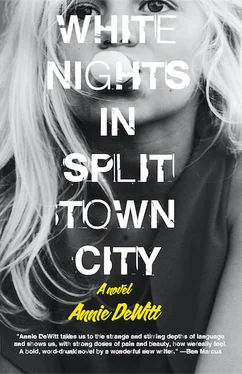
![Элизабет Ленхард - Свидание со смертью[Date With Death]](/books/79651/elizabet-lenhard-svidanie-so-smertyu-date-with-dea-thumb.webp)



